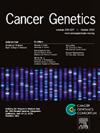Comparison of somatic variant oncogenicity classification using ClinGen/CGC/VICC guidelines and QIAGEN Clinical Insight Interpret decision support software
IF 2.1
4区 医学
Q4 GENETICS & HEREDITY
引用次数: 0
Abstract
Accurate clinical interpretation of somatic cancer variants is critical for diagnosis and guidance of precision oncology treatment. As the depth and breadth of genomic sequencing increased, laboratories developed independent standards for the classification of somatic variants. In response, a set of standards for classification were published by a collaboration among Clinical Genome Resource (ClinGen), Cancer Genomics Consortium (CGC) and Variant Interpretation for Cancer Consortium (VICC). This study evaluated these standards and compared the resulting classifications to the classifications generated by a clinical decision support software system, QIAGEN Clinical Insight (QCI) Interpret One, a system using a version of the 2015 consensus guidelines by the American College of Medical Genetics (ACMG) and Association for Molecular Pathology (AMP) customized for somatic assessment. The published variant set for validation was utilized and expanded by conducting a retrospective analysis using real-world cancer variants drawn from oncology cases tested at Mayo Clinic. For “oncogenic” and “likely oncogenic” variants in the combined datasets, automated classifications by the QCI system were 97.2% concordant with those assessed using the ClinGen/CGC/VICC system. The ClinGen/CGC/VICC standards led to more conservative variant classifications, with a larger proportion of variants assigned to the “variant of unknown significance” and “likely benign” designations. This study demonstrates that the ClinGen/CGC/VICC guidelines and clinical decision support tools can be effectively used together to facilitate somatic variant classification and interpretation.
使用ClinGen/CGC/VICC指南和QIAGEN临床洞察解释决策支持软件进行体细胞变异致癌性分类的比较
准确的临床解释体细胞癌变异是诊断和指导精确肿瘤治疗的关键。随着基因组测序的深度和广度的增加,实验室开发了独立的体细胞变异分类标准。为此,临床基因组资源(ClinGen)、癌症基因组学联盟(CGC)和癌症变异解释联盟(VICC)合作发布了一套分类标准。本研究对这些标准进行了评估,并将结果分类与临床决策支持软件系统QIAGEN clinical Insight (QCI) Interpret One生成的分类进行了比较,该系统使用了美国医学遗传学学院(ACMG)和分子病理学协会(AMP)为体细胞评估定制的2015年共识指南版本。通过对梅奥诊所测试的肿瘤病例中提取的真实癌症变异进行回顾性分析,利用并扩展了已发表的用于验证的变异集。对于合并数据集中的“致癌”和“可能致癌”变异,QCI系统的自动分类与使用ClinGen/CGC/VICC系统评估的结果一致性为97.2%。ClinGen/CGC/VICC标准导致了更保守的变体分类,更大比例的变体被分配到“未知意义的变体”和“可能良性的”名称。本研究表明,ClinGen/CGC/VICC指南和临床决策支持工具可以有效地结合使用,以促进体细胞变异的分类和解释。
本文章由计算机程序翻译,如有差异,请以英文原文为准。
求助全文
约1分钟内获得全文
求助全文
来源期刊

Cancer Genetics
ONCOLOGY-GENETICS & HEREDITY
CiteScore
3.20
自引率
5.30%
发文量
167
审稿时长
27 days
期刊介绍:
The aim of Cancer Genetics is to publish high quality scientific papers on the cellular, genetic and molecular aspects of cancer, including cancer predisposition and clinical diagnostic applications. Specific areas of interest include descriptions of new chromosomal, molecular or epigenetic alterations in benign and malignant diseases; novel laboratory approaches for identification and characterization of chromosomal rearrangements or genomic alterations in cancer cells; correlation of genetic changes with pathology and clinical presentation; and the molecular genetics of cancer predisposition. To reach a basic science and clinical multidisciplinary audience, we welcome original full-length articles, reviews, meeting summaries, brief reports, and letters to the editor.
 求助内容:
求助内容: 应助结果提醒方式:
应助结果提醒方式:


